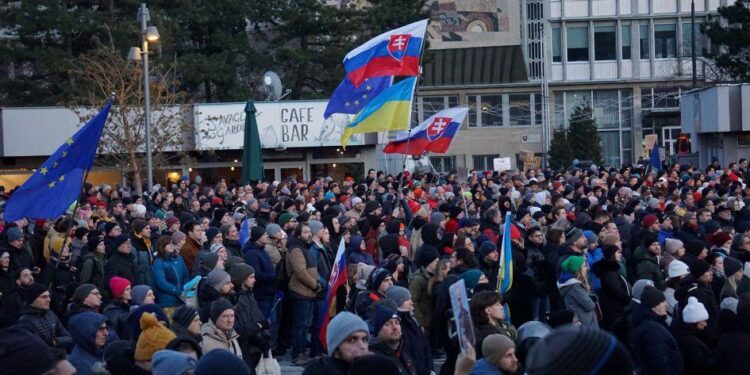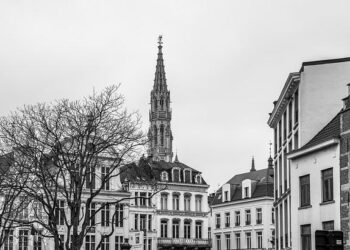Thousands of protesters took to the streets across Slovakia this week, rallying against the government of Prime Minister Robert Fico amid growing concerns over his pro-Russian policies. Demonstrators voiced their opposition to what they perceive as a shift in Slovakia’s foreign policy direction, demanding greater alignment with Western institutions and a firmer stance against Russian influence. The renewed mass protests mark a significant moment of civil unrest in the country, reflecting widespread unease over the current administration’s approach to international relations.
Thousands Rally in Slovakia Condemning Prime Minister Ficos Pro Russian Stance
Thousands of Slovakians took to the streets in Bratislava this weekend, voicing their frustration with the government’s increasingly pro-Russian trajectory under Prime Minister Robert Fico. Demonstrators held banners and chanted slogans demanding a realignment of Slovakia’s foreign policy towards stronger ties with the European Union and NATO. Organizers noted the turnout as one of the largest public demonstrations since Fico’s return to power, highlighting widespread concerns over alleged Kremlin influence in key sectors of Slovak politics.
The protest featured several key demands, including:
- Strengthening democratic institutions to prevent foreign interference
- Increased transparency in government dealings with Russian entities
- Support for sanctions against Moscow for its ongoing actions in Eastern Europe
- Promotion of energy independence away from Russian supplies
| Issue Highlighted | Public Concern |
|---|---|
| Political Influence | Suspected covert support for pro-Russia politicians |
| Energy Dependence | Reliance on Russian gas pipelines |
| Security | Potential vulnerability to cyberattacks |
Analyzing the Political Fallout and Public Sentiment Amid Rising Tensions
Public response to Prime Minister Fico’s pro-Russian stance has escalated into widespread dissent, illuminating deep political rifts within Slovakia. Many citizens express concern that the government’s alignment threatens national sovereignty and could jeopardize Slovakia’s position within the European Union and NATO. Protesters from various demographics unite, demanding more transparent foreign policy decisions and a firmer commitment to Western alliances. Political analysts note that the government’s approach risks alienating key international partners, while emboldening internal opposition movements.
Key elements driving public sentiment include:
- Economic uncertainty tied to shifting diplomatic ties
- Concerns over increased Russian influence in domestic affairs
- Growing mistrust in government transparency and accountability
- Heightened awareness of regional security dynamics
| Factor | Impact | Public Reaction |
|---|---|---|
| Energy Dependency | Rising reliance on Russian imports | Calls for diversification of energy sources |
| Media Freedom | Concerns about pro-Russian media influence | Demand for independent journalism |
| Security Policy | Ambiguity over NATO commitments | Public protests and political debates |
Calls for Transparency and Strengthened Democratic Institutions Grow Louder
Amid the swelling crowds in Bratislava, calls for greater governmental transparency have taken center stage. Protesters voiced their concerns over alleged backroom dealings and opacity in critical policy decisions that seem to align Slovakia closer with Russian interests. Civic groups, opposition leaders, and ordinary citizens alike are demanding comprehensive reforms to foster accountability and curb the influence of undisclosed foreign ties within the highest echelons of power.
The renewed protests also spotlight the urgent need to reinforce democratic institutions. Key demands include:
- Strengthening the independence of the judiciary
- Enhancing parliamentary oversight mechanisms
- Improving transparency in public administration
- Safeguarding media freedom from political interference
These measures are seen as essential in restoring public trust and ensuring that the democratic fabric resists any erosion driven by external or internal influences.
| Demand | Proposed Reform | Expected Impact |
|---|---|---|
| Judicial Independence | Reform of judicial appointment process | Reduce political interference |
| Parliamentary Oversight | Regular transparent reporting by ministries | Enhance accountability |
| Public Administration | Mandatory disclosure of lobbying activities | Increase transparency |
| Media Freedom | Legislation protecting editorial independence | Prevent censorship |
To Conclude
As protests continue to surge across Slovakia, the afternoon gatherings reflect a mounting public discontent with Prime Minister Robert Fico’s administration and its perceived alignment with pro-Russian policies. Observers note that the demonstrations signal a critical moment in Slovakia’s political landscape, with citizens demanding greater transparency and a reaffirmation of the country’s commitments to European and transatlantic partnerships. How the government responds in the coming days will be closely watched both domestically and internationally, as the nation grapples with its geopolitical direction amidst ongoing regional tensions.
















